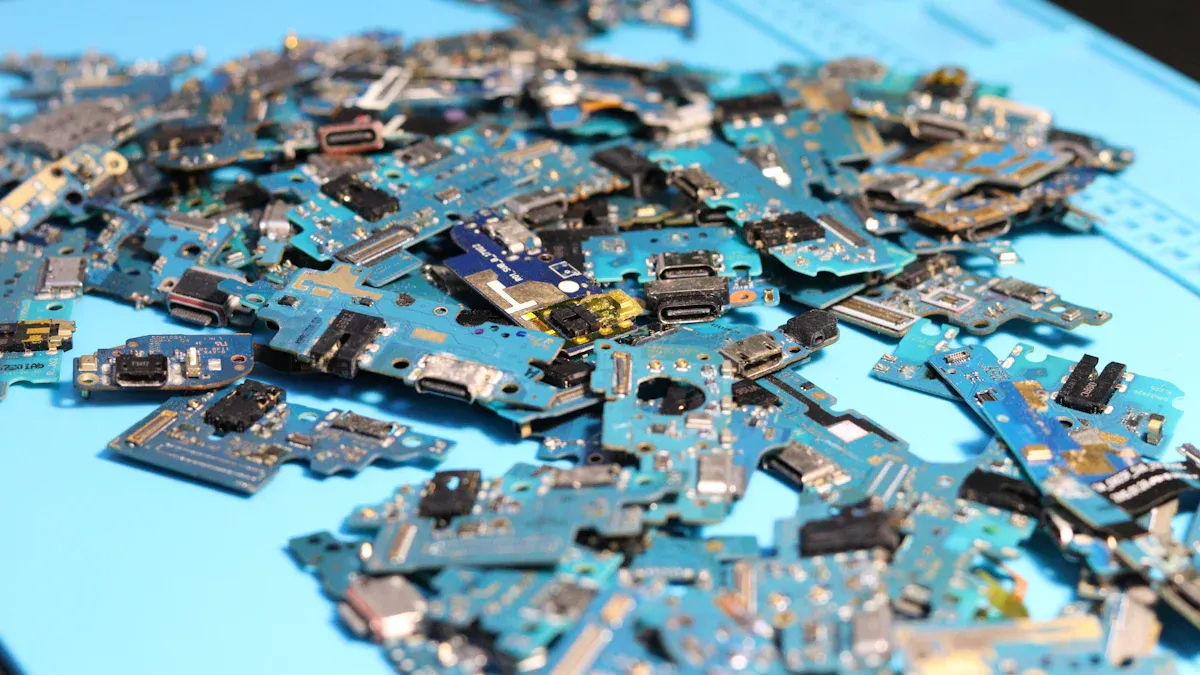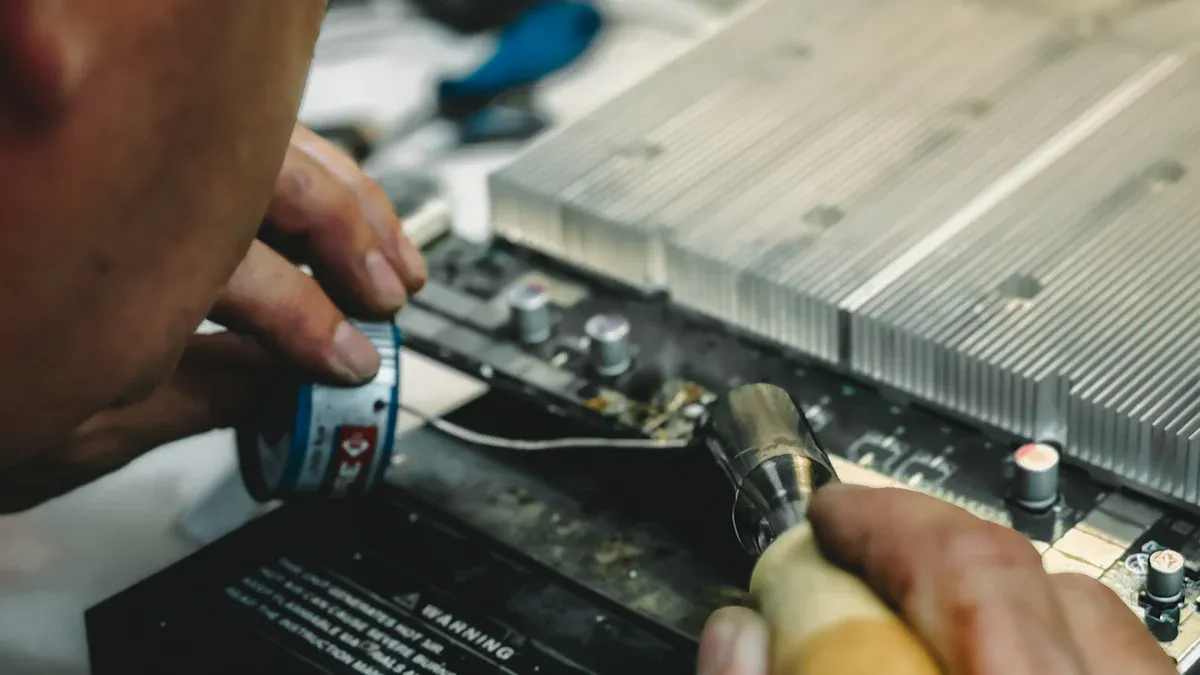How to Find Reliable Wholesale Circuits Chip Suppliers for Your Business

Finding a reliable wholesale circuits chip supplier protects your business from major risks. You need to check supplier authenticity and quality before making any purchase. Many businesses face problems when they trust the wrong suppliers. Some common risks include:
Supply interruptions from disasters or political events in key regions
Delays due to fragile shipping routes
Loss of materials if a supplier depends on rare resources
Cybersecurity threats that can stop production
You can avoid these problems by verifying suppliers and using trusted sources. Careful research helps you keep your supply chain strong.
Key Takeaways
Check supplier quality, certifications, and customer support to ensure reliability and avoid risks.
Verify suppliers by reviewing licenses, certificates, and customer reviews on trusted platforms.
Use online platforms and direct manufacturer contacts to find authentic and well-stocked chip suppliers.
Visit supplier sites and request samples to confirm product quality before placing large orders.
Negotiate clear contracts with detailed terms to protect your business and maintain a strong supply chain.
Supplier Reliability
Key Qualities
When you look for a wholesale circuits chip supplier, you need to focus on certain key qualities. These qualities help you avoid problems and keep your business running smoothly. Industry experts recommend that you check for the following:
Quality and reliability: Choose suppliers who offer components from reputable manufacturers and hold industry certifications like ISO 9001.
Compatibility: Make sure the chips fit your system’s requirements.
Availability: Reliable suppliers keep steady stock and offer clear lead times.
Cost: Balance price with value. Low prices should not mean poor quality.
Supplier relationships: Good suppliers provide strong customer support, on-time delivery, and helpful after-sales service.
Tip: Always ask for references and samples. Visiting a supplier’s factory or checking their quality control process can give you extra confidence.
You should also watch for red flags. The table below shows some warning signs that a supplier may not be reliable:
Red Flag Category | Description | Example Indicators |
|---|---|---|
Order & Capacity | Vague order policies, unwillingness to provide samples | Refusal to share MOQ or pre-production products |
Logistics | No regional warehouses, hidden shipping fees | Subcontracted shipping, surprise rush charges |
Customer Support | Slow or indirect technical help | Ticket-based systems, slow response times |
Certifications | Missing key certifications or documents | No ISO 9001, no batch testing reports |
Factory Relationships | No direct contracts with major brands | No links to Micron, Samsung, or Texas Instruments |
Transparency | Hidden fees, poor communication | Unclear pricing, lack of cost breakdowns |
Why It Matters
Supplier reliability affects every part of your business. If you choose an unreliable supplier, you risk getting defective or inconsistent chips. This can lead to more warranty claims, product recalls, and damage to your brand’s reputation. Production delays and disruptions often happen when suppliers miss deadlines or deliver poor-quality parts. You may also face higher costs from rework, scrap, or failing to meet regulatory standards.
Supplier reliability ratings from third-party organizations help you avoid these risks. These ratings show if a supplier meets quality, safety, and regulatory standards. They also help you spot suppliers who might sell counterfeit parts, which can lead to legal trouble and fines—even if you did not know the parts were fake.
When you work with reliable suppliers, you build trust with your customers. You also protect your business from costly mistakes and keep your supply chain strong.
Verify Suppliers
Background Checks
You need to check a supplier’s background before you buy any wholesale circuits chip. Start by looking at the company’s registration and legal status. Ask for business licenses and tax documents. Reliable suppliers will share these without hesitation. You should also request certificates like ISO 9001 or product datasheets. These documents show that the supplier meets industry standards and sells genuine products.
Use trusted platforms to verify suppliers. Sites like Octopart, Digi-Key, Mouser, Alibaba, and Global Sources let you see supplier profiles, ratings, and transaction history. These platforms often list independent distributors for major brands such as Texas Instruments, Samsung, and Intel. Compare prices across these sites to spot fair offers. Make sure the supplier has clear payment and shipping options that fit your needs. Always review their shipping and return policies so you know what to expect if problems arise.
Tip: Open communication with your supplier helps you spot issues early. Ask questions and check how quickly they respond.
You can also join forums like Arduino or Quora. Community members often share their experiences with different suppliers. This feedback can help you avoid risky choices.
Reviews and References
Customer reviews and references give you a real look at a supplier’s reliability. Read testimonials and ratings on sourcing platforms. Positive feedback means the supplier meets project needs and keeps quality high. Reliable suppliers often ask for feedback and use it to improve their service.
Reviews show if a supplier delivers on time and handles problems well.
References from other buyers help you judge if the supplier is right for your business.
Good reviews lower your risk of delays or poor-quality parts.
If you see many complaints or negative comments, look for another supplier. Trustworthy suppliers value their reputation and work hard to keep customers happy.
Find Wholesale Circuits Chip Suppliers

Search Platforms
You can find many wholesale circuits chip suppliers by using specialized online platforms. These platforms help you compare prices, check stock, and review supplier details in one place. For example, Bid Chip is a leading platform that connects buyers with a wide range of suppliers. It focuses on quality, fast delivery, and customer satisfaction. Bid Chip uses an open vetting process, so you can buy from many suppliers at affordable prices. The platform protects your money with an escrow-like service and offers lab testing to make sure you get real, high-quality chips. This makes it easier for you to avoid counterfeit products and risky deals.
Other trusted platforms include Octopart, Digi-Key, Mouser, Alibaba, and Global Sources. These sites let you search for wholesale circuits chip suppliers and compare offers from different companies. You can also find independent distributors for major brands like Texas Instruments, Samsung, and Intel. For example, Direct Components, Inc. and Express Technology Group have long histories and strong reputations for supplying authentic parts. They use strict testing and quality checks to make sure you get genuine chips.
Comprehensive product catalogs and part search tools on these platforms save you time. You can filter parts by brand, size, or features. Many sites show real-time stock and prices, so you know what is available right away. Some platforms even provide datasheets, 3D models, and risk assessments. These tools help you avoid last-minute problems and make better buying decisions.
Tip: Always use platforms that offer clear supplier ratings, secure payment options, and detailed product information. This helps you avoid scams and get the best value for your business.
Manufacturer Direct
You can also buy wholesale circuits chip products directly from manufacturers or trusted factories. This method gives you several advantages. When you buy straight from the source, you often get better prices and faster service. Manufacturers use strict quality control, so you can trust the chips you receive. You may also find rare or hard-to-get parts that are not available through regular distributors.
Buying from authorized distributors is another safe option. Distributors work closely with manufacturers and provide real parts, full documentation, and support. You can compare prices and stock across many distributors, which helps you plan your orders and avoid delays. Distributors also offer flexible order sizes and help you with technical questions.
Here are some points to consider when choosing between manufacturers and distributors:
Buying direct from manufacturers can save you money and time. You get access to bulk deals and a wide range of parts.
Distributors give you more choices and help you compare different brands and prices. They also offer strong customer support and warranties.
Always check if the distributor or manufacturer is authorized. This reduces the risk of getting fake or low-quality chips.
Use online tools to track stock, prices, and lead times. This helps you manage your supply chain and avoid running out of parts.
Note: If you need special parts or large orders, going direct to the manufacturer may be best. For smaller orders or when you need help, a trusted distributor is a good choice.
By using both search platforms and direct sourcing, you can build a strong supply chain for your business. Make sure you use catalogs and search tools to find the best wholesale circuits chip suppliers and keep your projects on track.
Assess Quality

Site Visits
You can learn a lot about a supplier by visiting their facility. On-site visits help you see how the supplier makes and stores circuits chips. You can check if they follow quality control steps every day, not just on paper. Many reliable suppliers hold certifications like ISO 9001, UL, or RoHS. These show they care about quality and safety.
During your visit, look for these things:
Clean and organized work areas
Proper storage for sensitive chips
Quality engineers and lab facilities for testing
Up-to-date certifications displayed
Staff following safety and handling rules
You can also ask to see how they test chips. Many suppliers use burn-in tests and environmental stress screenings. These tests help find weak chips before they reach you. On-site audits let you confirm that the supplier uses real quality checks, not just promises. This reduces the risk of getting counterfeit or poor-quality chips.
Tip: Trust but verify. Even if a supplier looks good on paper, a site visit can reveal hidden problems.
Request Samples
Requesting samples is a smart way to check chip quality before you place a big order. Most businesses follow a step-by-step process to do this:
Send a Request for Information (RFI) or Request for Quotation (RFQ) to the supplier.
Use your approved vendor list to pick suppliers who meet your needs.
Shortlist suppliers based on their technical skills, quality, and delivery record.
Ask for samples and review them with your team, including engineers and quality control staff.
Check the samples for key criteria:
Current consumption in different modes
Maximum operating frequency
Input/output voltage levels
Traceability details like lot codes and manufacturer ID
Review customer references and supplier reputation.
Negotiate terms and finalize your order if the samples meet your standards.
You should always test samples for reliability and performance. This helps you avoid costly mistakes and ensures the chips will work in your products.
Good sample evaluation protects your business and builds trust with your supplier.
Negotiate Terms
Contracts
When you work with wholesale circuits chip suppliers, you need a clear contract. A good contract protects your business and sets the rules for both sides. You should always review the contract before you sign. Many electronics businesses negotiate contract length to balance flexibility and stability. Short-term contracts let you compare suppliers, but long-term contracts encourage suppliers to invest in better service and lower costs for you.
Here are some common contract terms you will see:
The supplier must confirm your order in writing.
Delivery dates are estimates, not guarantees. Suppliers often do not take responsibility for delays.
You must inspect goods when they arrive. If you find defects, you usually have 15 days to return them. Some suppliers charge restocking fees for incorrect orders.
Warranties often cover only basic fit, form, and function for 30 days. Suppliers rarely promise that chips will work for your special needs.
Suppliers may ship up to 10% more or less than you ordered.
Shipments are usually FOB shipping point, so you take responsibility once the carrier picks up the goods.
Payment terms are often net 1 day from invoice. Some suppliers want payment in advance or cash on delivery.
Prices may change if you do not accept the offer within 30 days.
Contracts often name a legal jurisdiction, such as the State of Florida.
Late payments can lead to service charges and legal fees.
Tip: Long-term contracts can help you get better prices and more reliable supply. Suppliers may invest more in your needs if they know you will work with them for a long time.
Key Clauses
You should include key clauses in your contract to protect against quality and delivery problems. These clauses make your expectations clear and give you options if things go wrong.
List detailed product specifications. Do not allow changes without your written approval.
Set delivery terms. Name the delivery location, who picks the carrier, and who pays for shipping.
Define how you will inspect and accept products. Give yourself time to check for defects and reject bad parts.
Add warranties. Require that products match your specs, are free from defects, and do not break any laws.
Require the supplier to fix or replace defective chips at their own cost.
Include a way to end the contract if the supplier breaks the rules or goes out of business.
Use quality management steps. Set clear standards, ask for quality checks, and track supplier performance.
Encourage open communication. Work together to solve problems and improve quality.
You can also use smart negotiation strategies to get better terms:
Share risks with the supplier to lower costs.
Order in bulk to get discounts.
Start with non-price terms to build trust.
Use digital tools for transparent bidding.
Bundle your orders to increase your bargaining power.
Always know your bottom line and be ready to walk away if needed.
A strong contract with the right clauses helps you avoid common problems and keeps your supply chain safe.
You can find reliable wholesale circuits chip suppliers by following a clear process. Start with a checklist to guide your decisions:
Negotiate flexible contracts and clear terms.
Set up strong communication with suppliers.
Review supplier performance regularly.
Use trusted platforms and industry networks to stay informed. Reach out to recommended suppliers and join forums to share experiences and learn from others.
FAQ
How do you spot a fake circuits chip supplier?
You can check business licenses and certifications. Look for reviews from other buyers. Trusted platforms like Digi-Key or Mouser help you find real suppliers. If a supplier refuses to share documents or has many complaints, you should avoid them.
What documents should you ask from a supplier?
Always ask for:
Business license
ISO 9001 certificate
Product datasheets
Test reports
These documents show the supplier is real and cares about quality.
Can you buy small quantities from wholesale suppliers?
Yes, many wholesale suppliers let you order small amounts. Some have a minimum order quantity (MOQ). You should ask about this before you buy. Distributors often offer flexible order sizes.
Why should you request samples before a big order?
Samples help you check the quality of the chips. You can test if they work in your products. This step protects you from buying bad or fake parts. Always review samples with your team.
What should you do if a supplier delivers faulty chips?
You should contact the supplier right away. Check your contract for return and warranty terms. Most suppliers let you return faulty chips within a set time. Keep records of all communication and test results.
See Also
Ways Analog Devices Maintains A Strong Chip Supply Network
Tips For Quickly Procuring Electronic Parts During Emergencies
Proven Methods To Overcome Shortages In Electronic Components
Selecting The Best Low-Power MCU For Your Next Project
Best Three Synchronous Buck Converter Chips To Watch In 2025
